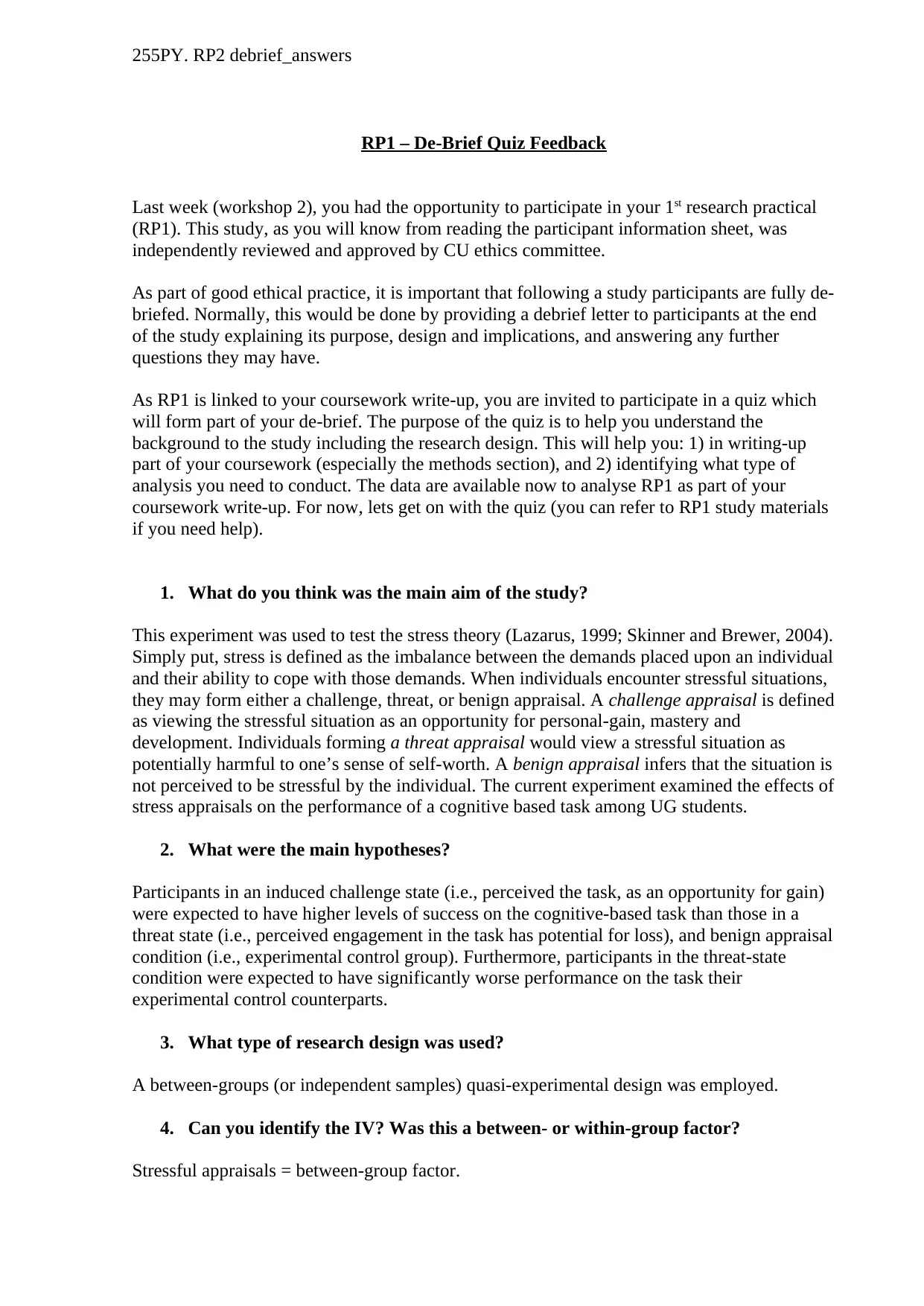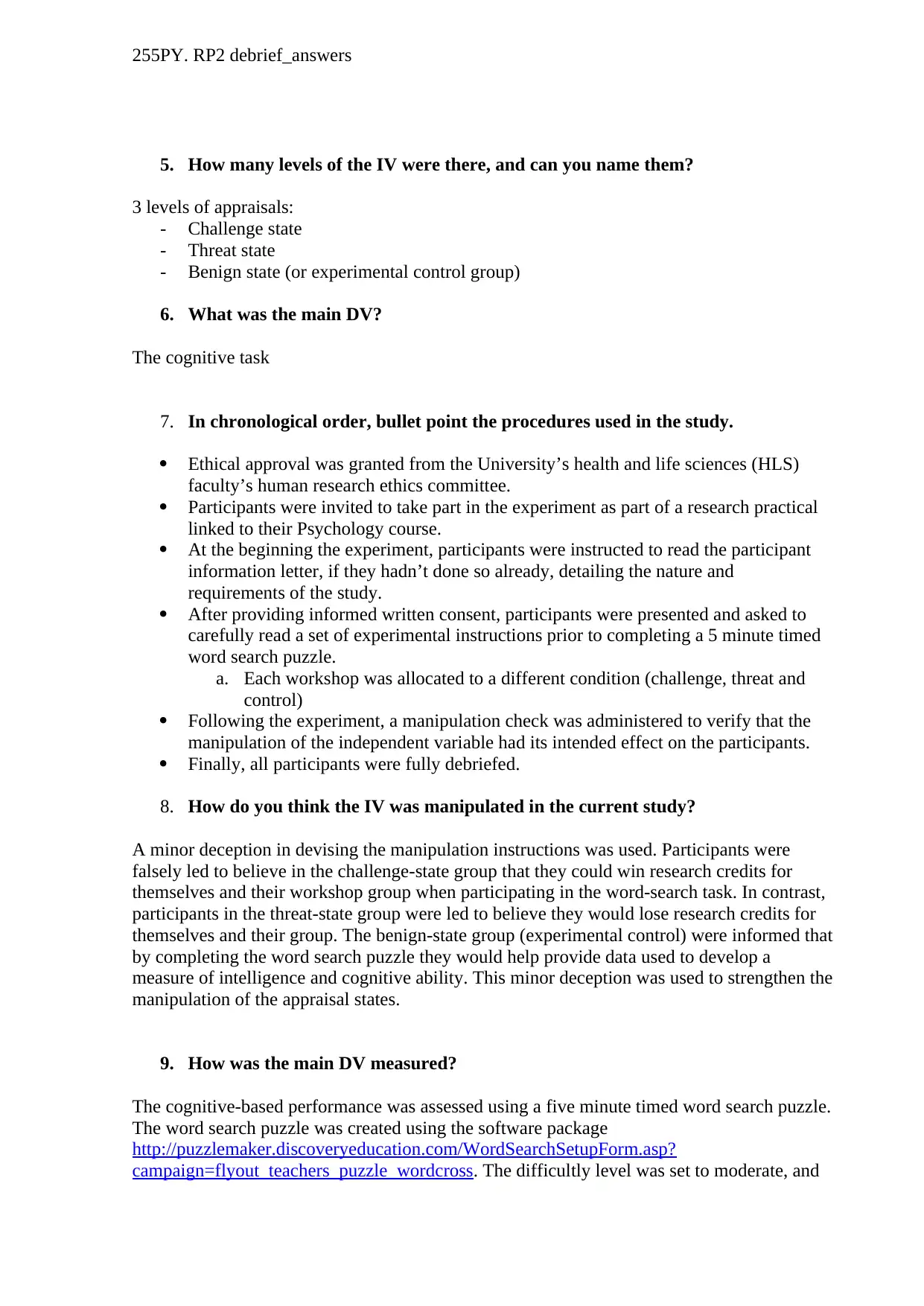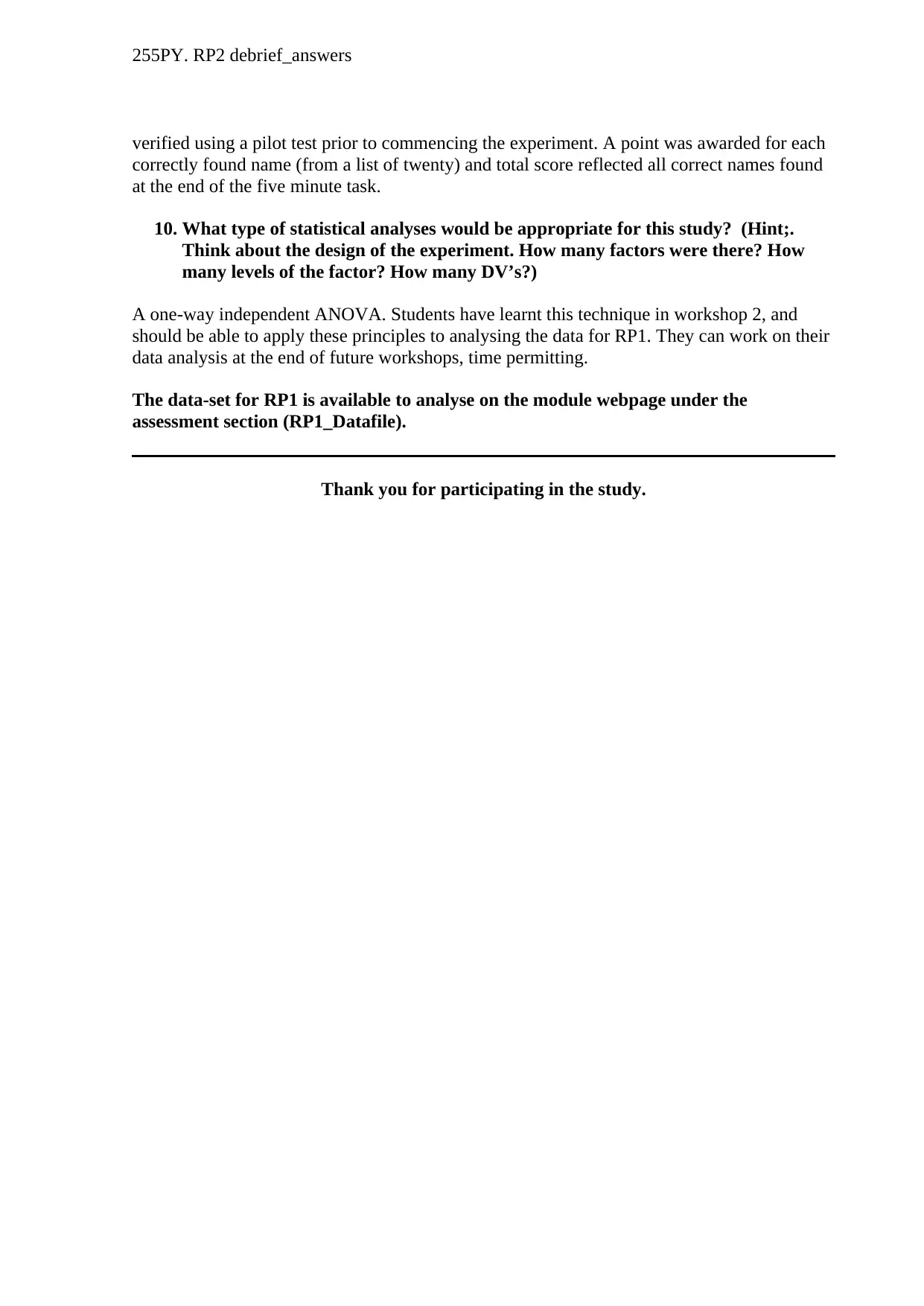De-Brief Quiz Feedback
VerifiedAdded on 2019/09/19
|3
|1085
|582
Discussion Board Post
AI Summary
This assignment content provides information about a research practical (RP1) that was conducted as part of a workshop series. The study aimed to test the stress theory by examining the effects of stress appraisals on the performance of a cognitive-based task among undergraduate students. The experiment employed a between-groups quasi-experimental design, with three levels of stressful appraisals: challenge state, threat state, and benign state (experimental control). The main dependent variable was the cognitive task performance measured using a five-minute timed word search puzzle.
Contribute Materials
Your contribution can guide someone’s learning journey. Share your
documents today.

255PY. RP2 debrief_answers
RP1 – De-Brief Quiz Feedback
Last week (workshop 2), you had the opportunity to participate in your 1st research practical
(RP1). This study, as you will know from reading the participant information sheet, was
independently reviewed and approved by CU ethics committee.
As part of good ethical practice, it is important that following a study participants are fully de-
briefed. Normally, this would be done by providing a debrief letter to participants at the end
of the study explaining its purpose, design and implications, and answering any further
questions they may have.
As RP1 is linked to your coursework write-up, you are invited to participate in a quiz which
will form part of your de-brief. The purpose of the quiz is to help you understand the
background to the study including the research design. This will help you: 1) in writing-up
part of your coursework (especially the methods section), and 2) identifying what type of
analysis you need to conduct. The data are available now to analyse RP1 as part of your
coursework write-up. For now, lets get on with the quiz (you can refer to RP1 study materials
if you need help).
1. What do you think was the main aim of the study?
This experiment was used to test the stress theory (Lazarus, 1999; Skinner and Brewer, 2004).
Simply put, stress is defined as the imbalance between the demands placed upon an individual
and their ability to cope with those demands. When individuals encounter stressful situations,
they may form either a challenge, threat, or benign appraisal. A challenge appraisal is defined
as viewing the stressful situation as an opportunity for personal-gain, mastery and
development. Individuals forming a threat appraisal would view a stressful situation as
potentially harmful to one’s sense of self-worth. A benign appraisal infers that the situation is
not perceived to be stressful by the individual. The current experiment examined the effects of
stress appraisals on the performance of a cognitive based task among UG students.
2. What were the main hypotheses?
Participants in an induced challenge state (i.e., perceived the task, as an opportunity for gain)
were expected to have higher levels of success on the cognitive-based task than those in a
threat state (i.e., perceived engagement in the task has potential for loss), and benign appraisal
condition (i.e., experimental control group). Furthermore, participants in the threat-state
condition were expected to have significantly worse performance on the task their
experimental control counterparts.
3. What type of research design was used?
A between-groups (or independent samples) quasi-experimental design was employed.
4. Can you identify the IV? Was this a between- or within-group factor?
Stressful appraisals = between-group factor.
RP1 – De-Brief Quiz Feedback
Last week (workshop 2), you had the opportunity to participate in your 1st research practical
(RP1). This study, as you will know from reading the participant information sheet, was
independently reviewed and approved by CU ethics committee.
As part of good ethical practice, it is important that following a study participants are fully de-
briefed. Normally, this would be done by providing a debrief letter to participants at the end
of the study explaining its purpose, design and implications, and answering any further
questions they may have.
As RP1 is linked to your coursework write-up, you are invited to participate in a quiz which
will form part of your de-brief. The purpose of the quiz is to help you understand the
background to the study including the research design. This will help you: 1) in writing-up
part of your coursework (especially the methods section), and 2) identifying what type of
analysis you need to conduct. The data are available now to analyse RP1 as part of your
coursework write-up. For now, lets get on with the quiz (you can refer to RP1 study materials
if you need help).
1. What do you think was the main aim of the study?
This experiment was used to test the stress theory (Lazarus, 1999; Skinner and Brewer, 2004).
Simply put, stress is defined as the imbalance between the demands placed upon an individual
and their ability to cope with those demands. When individuals encounter stressful situations,
they may form either a challenge, threat, or benign appraisal. A challenge appraisal is defined
as viewing the stressful situation as an opportunity for personal-gain, mastery and
development. Individuals forming a threat appraisal would view a stressful situation as
potentially harmful to one’s sense of self-worth. A benign appraisal infers that the situation is
not perceived to be stressful by the individual. The current experiment examined the effects of
stress appraisals on the performance of a cognitive based task among UG students.
2. What were the main hypotheses?
Participants in an induced challenge state (i.e., perceived the task, as an opportunity for gain)
were expected to have higher levels of success on the cognitive-based task than those in a
threat state (i.e., perceived engagement in the task has potential for loss), and benign appraisal
condition (i.e., experimental control group). Furthermore, participants in the threat-state
condition were expected to have significantly worse performance on the task their
experimental control counterparts.
3. What type of research design was used?
A between-groups (or independent samples) quasi-experimental design was employed.
4. Can you identify the IV? Was this a between- or within-group factor?
Stressful appraisals = between-group factor.
Secure Best Marks with AI Grader
Need help grading? Try our AI Grader for instant feedback on your assignments.

255PY. RP2 debrief_answers
5. How many levels of the IV were there, and can you name them?
3 levels of appraisals:
- Challenge state
- Threat state
- Benign state (or experimental control group)
6. What was the main DV?
The cognitive task
7. In chronological order, bullet point the procedures used in the study.
Ethical approval was granted from the University’s health and life sciences (HLS)
faculty’s human research ethics committee.
Participants were invited to take part in the experiment as part of a research practical
linked to their Psychology course.
At the beginning the experiment, participants were instructed to read the participant
information letter, if they hadn’t done so already, detailing the nature and
requirements of the study.
After providing informed written consent, participants were presented and asked to
carefully read a set of experimental instructions prior to completing a 5 minute timed
word search puzzle.
a. Each workshop was allocated to a different condition (challenge, threat and
control)
Following the experiment, a manipulation check was administered to verify that the
manipulation of the independent variable had its intended effect on the participants.
Finally, all participants were fully debriefed.
8. How do you think the IV was manipulated in the current study?
A minor deception in devising the manipulation instructions was used. Participants were
falsely led to believe in the challenge-state group that they could win research credits for
themselves and their workshop group when participating in the word-search task. In contrast,
participants in the threat-state group were led to believe they would lose research credits for
themselves and their group. The benign-state group (experimental control) were informed that
by completing the word search puzzle they would help provide data used to develop a
measure of intelligence and cognitive ability. This minor deception was used to strengthen the
manipulation of the appraisal states.
9. How was the main DV measured?
The cognitive-based performance was assessed using a five minute timed word search puzzle.
The word search puzzle was created using the software package
http://puzzlemaker.discoveryeducation.com/WordSearchSetupForm.asp?
campaign=flyout_teachers_puzzle_wordcross. The difficultly level was set to moderate, and
5. How many levels of the IV were there, and can you name them?
3 levels of appraisals:
- Challenge state
- Threat state
- Benign state (or experimental control group)
6. What was the main DV?
The cognitive task
7. In chronological order, bullet point the procedures used in the study.
Ethical approval was granted from the University’s health and life sciences (HLS)
faculty’s human research ethics committee.
Participants were invited to take part in the experiment as part of a research practical
linked to their Psychology course.
At the beginning the experiment, participants were instructed to read the participant
information letter, if they hadn’t done so already, detailing the nature and
requirements of the study.
After providing informed written consent, participants were presented and asked to
carefully read a set of experimental instructions prior to completing a 5 minute timed
word search puzzle.
a. Each workshop was allocated to a different condition (challenge, threat and
control)
Following the experiment, a manipulation check was administered to verify that the
manipulation of the independent variable had its intended effect on the participants.
Finally, all participants were fully debriefed.
8. How do you think the IV was manipulated in the current study?
A minor deception in devising the manipulation instructions was used. Participants were
falsely led to believe in the challenge-state group that they could win research credits for
themselves and their workshop group when participating in the word-search task. In contrast,
participants in the threat-state group were led to believe they would lose research credits for
themselves and their group. The benign-state group (experimental control) were informed that
by completing the word search puzzle they would help provide data used to develop a
measure of intelligence and cognitive ability. This minor deception was used to strengthen the
manipulation of the appraisal states.
9. How was the main DV measured?
The cognitive-based performance was assessed using a five minute timed word search puzzle.
The word search puzzle was created using the software package
http://puzzlemaker.discoveryeducation.com/WordSearchSetupForm.asp?
campaign=flyout_teachers_puzzle_wordcross. The difficultly level was set to moderate, and

255PY. RP2 debrief_answers
verified using a pilot test prior to commencing the experiment. A point was awarded for each
correctly found name (from a list of twenty) and total score reflected all correct names found
at the end of the five minute task.
10. What type of statistical analyses would be appropriate for this study? (Hint;.
Think about the design of the experiment. How many factors were there? How
many levels of the factor? How many DV’s?)
A one-way independent ANOVA. Students have learnt this technique in workshop 2, and
should be able to apply these principles to analysing the data for RP1. They can work on their
data analysis at the end of future workshops, time permitting.
The data-set for RP1 is available to analyse on the module webpage under the
assessment section (RP1_Datafile).
Thank you for participating in the study.
verified using a pilot test prior to commencing the experiment. A point was awarded for each
correctly found name (from a list of twenty) and total score reflected all correct names found
at the end of the five minute task.
10. What type of statistical analyses would be appropriate for this study? (Hint;.
Think about the design of the experiment. How many factors were there? How
many levels of the factor? How many DV’s?)
A one-way independent ANOVA. Students have learnt this technique in workshop 2, and
should be able to apply these principles to analysing the data for RP1. They can work on their
data analysis at the end of future workshops, time permitting.
The data-set for RP1 is available to analyse on the module webpage under the
assessment section (RP1_Datafile).
Thank you for participating in the study.
1 out of 3
![[object Object]](/_next/static/media/star-bottom.7253800d.svg)

